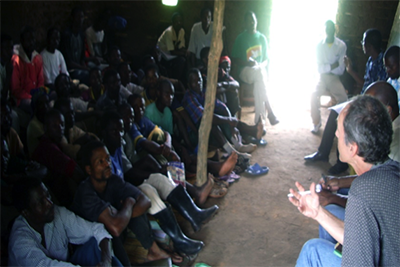
The National Cooperative Business Association CLUSA International (NCBA CLUSA) is celebrating a quarter century of high-impact, continuous development work in Mozambique this September.
As one of the first international non-governmental organizations to engage in market-based development in Mozambique, NCBA CLUSA pioneered market-linked producer organizations and helped create an enabling environment for farmer associations and agricultural cooperatives—all while building local capacity.
NCBA CLUSA began its work in Mozambique at a turning point in the region. The country was emerging from a protracted civil war that killed a million people and destroyed much of the country’s rural economy and infrastructure. NGOs were transitioning from emergency and humanitarian responses to long-term reconstruction and development. Politically, Mozambique had just adopted multiparty democracy, holding its first free and competitive elections in 1994. Economically, the country was moving away from a centrally planned to a market economy.
At the time, farmers were reluctant to join any type of organization due to their negative experiences in the past with government-led cooperatives and communal villages. Meanwhile, most rural households relied on subsistence farming, and farmers—who were used to government price setting—did not know how to navigate Mozambique’s emerging market economy.
But a new approach to organizing held promise. Under the Rural Group Enterprise Development (RGED) program, NCBA CLUSA launched its work in September 1995 with funding from the U. S. Agency for International Development (USAID). The program recruited local staff in October 1995, field staff came on board in January 1996, and services to the first communities began the following month.
“The initial results of our work in four districts of Nampula were encouraging,” said Alex Serrano, NCBA CLUSA’s Senior Vice President for International Programs. At the time, Serrano was the organization’s first Mozambique Country Director. By June 1996, 27 newly-formed farmer associations had signed contracts with buyers and marketed 1,000 metric tons of maize and groundnuts, marking a new era for small farmers in Mozambique. That same year the first 18 farmer associations signed contracts with cotton companies.
“Farmer associations in many ways became like a ‘school’ for farmers. They were essential to help smallholders acquire the critical information and skills they needed to successfully operate in a market economy,” Serrano said.
Twenty-five years later, that work has impacted more than half a million Mozambicans and supported the establishment of thousands of farmer groups and hundreds of small and medium-sized enterprises and agribusiness across seven provinces in central and northern Mozambique.
Mozambique has undergone tremendous social, economic and political transformation since NCBA CLUSA first began its work in Nampula in September 1995. Still, rural populations continue to experience power, knowledge and financial imbalances that limit their capacity to fully and fairly engage with market actors.
Despite achieving one of the highest economic growth rates in Africa over the past 20 years,[1] Mozambique remains one of the poorest countries in the world.
Over the past quarter century, NCBA CLUSA has worked to address these imbalances by investing in rural communities through development activities funded by the Norwegian Government, U.S. Agency for International Development, International Fund for Agriculture Development, the Bill and Melinda Gates Foundation, the Swiss Cooperation, the Netherlands and, most recently, the Austrian Development Agency.
In the coming weeks, Co-op Weekly will highlight some of NCBA CLUSA’s key achievements and milestones in Mozambique, ranging from enabling environments and value chain development to market linkages and climate smart agriculture.
[1] In 2014, Mozambique’s GDP was 7.4% compared to Sub-Saharan Africa GDP at 4.6% (World Bank).


